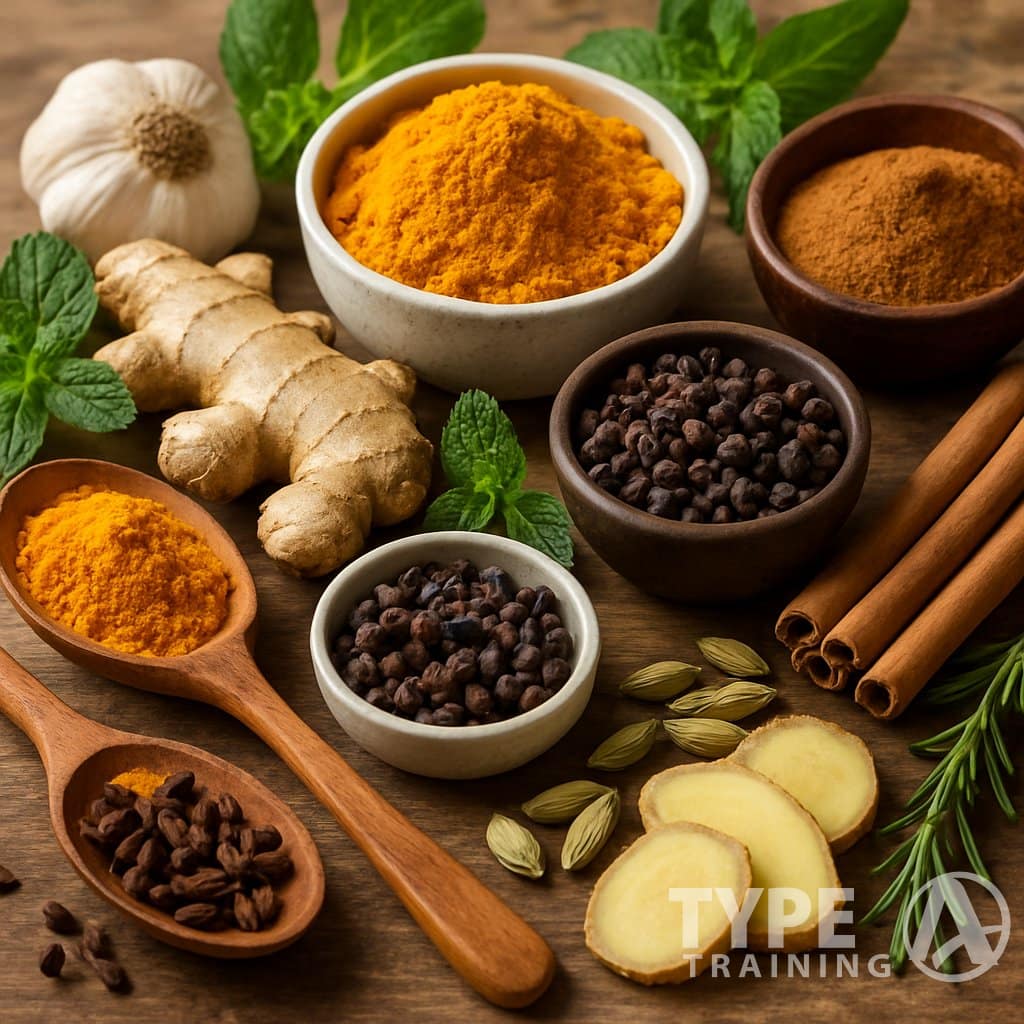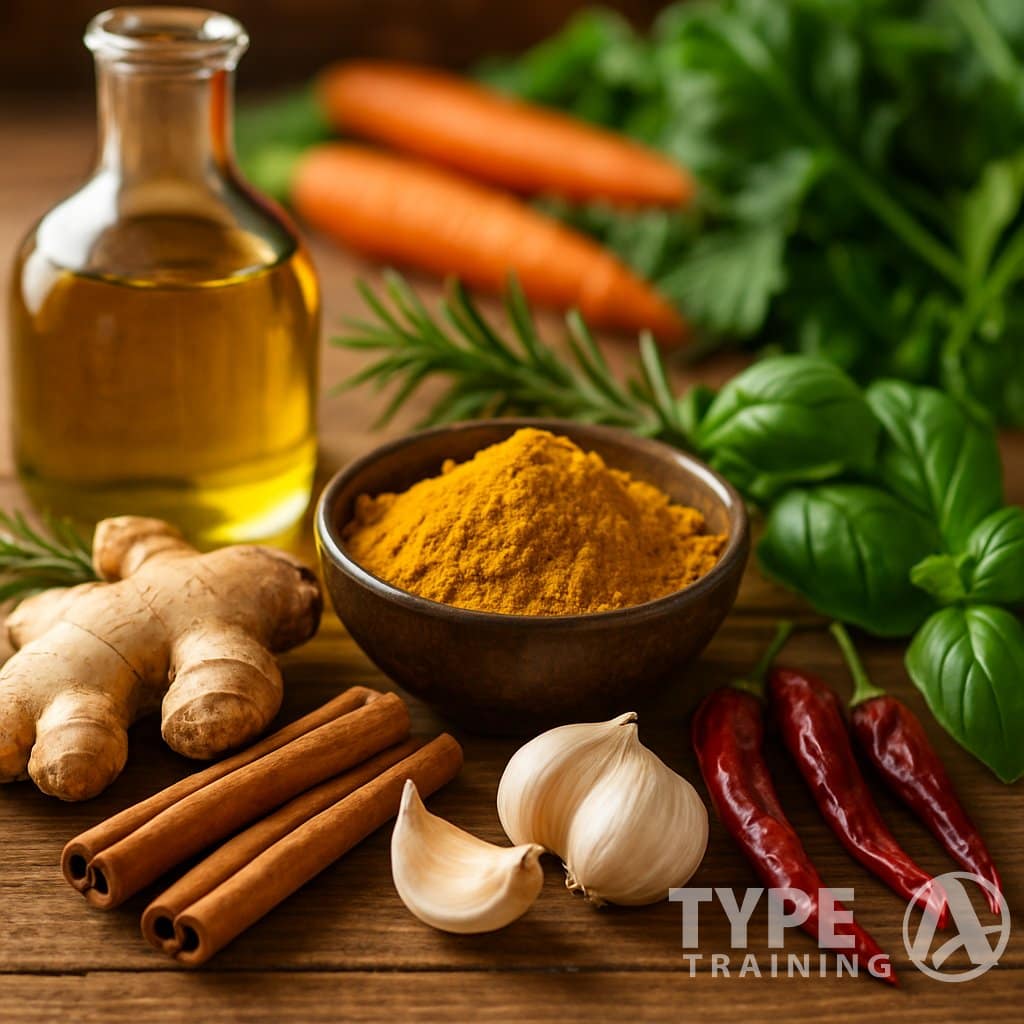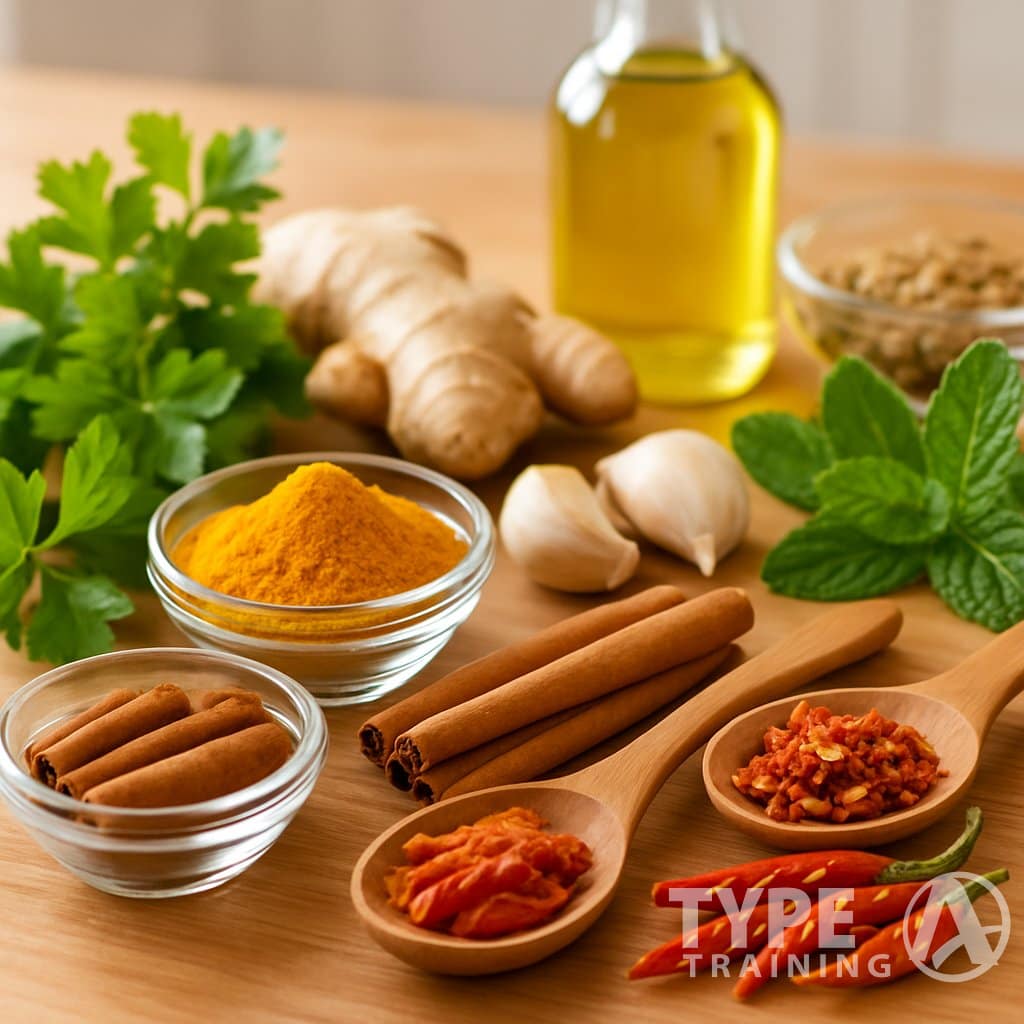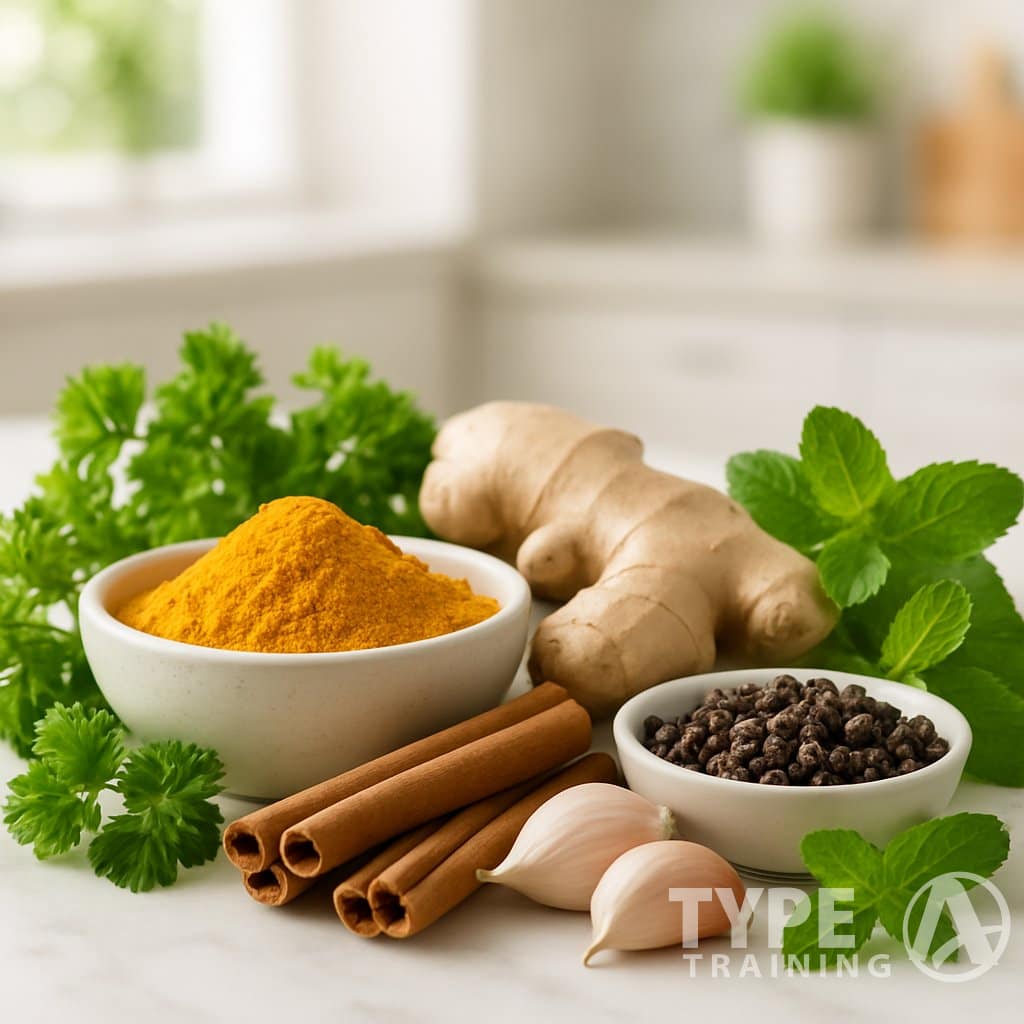Your spice rack isn’t just about flavor—it’s a legit medicine cabinet for your gut. Many herbs and spices pack powerful compounds that fight inflammation and support digestive wellness.
Adding anti-inflammatory spices like turmeric, ginger, and bay leaves to your meals can really cut down gut inflammation and give your digestion a boost.
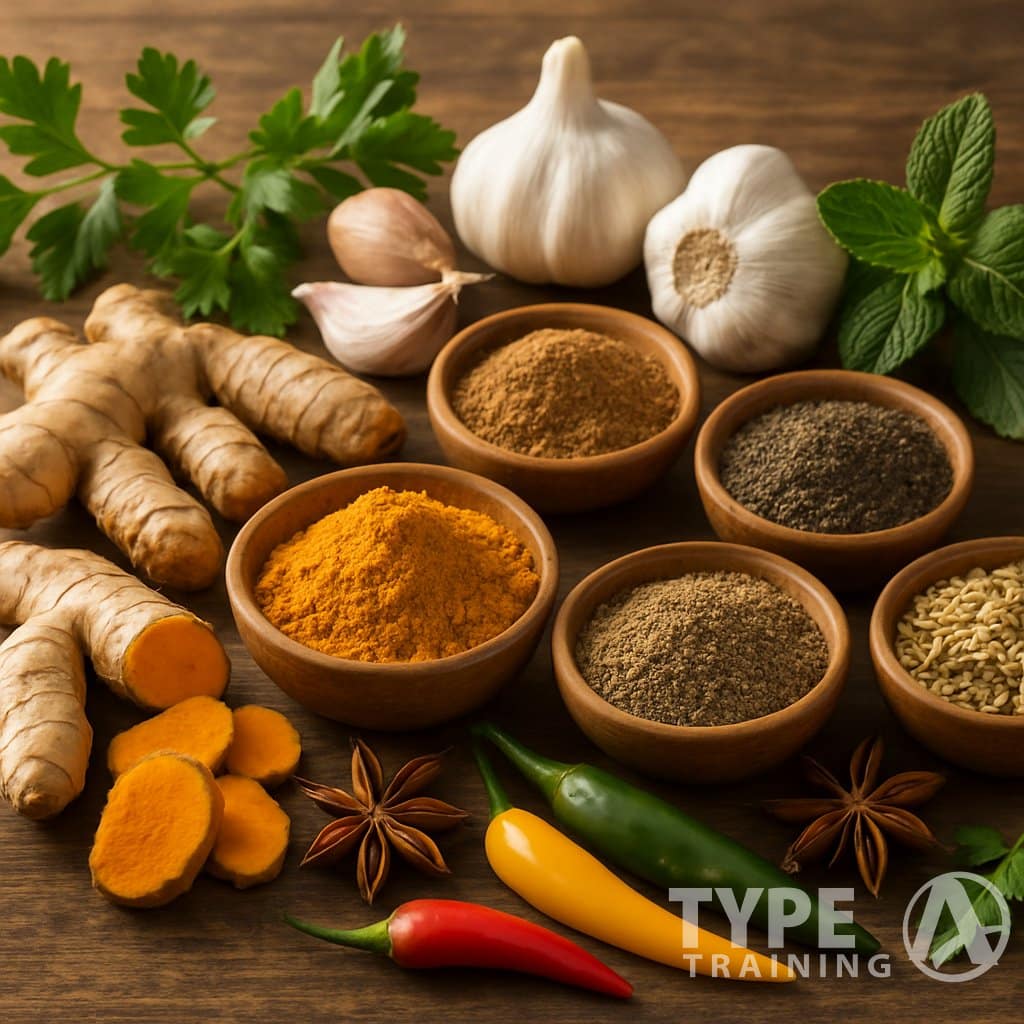
You don’t have to change your whole diet to get the benefits. Just adding a few of these potent plant-based ingredients can make a noticeable difference.
Popular posts:
Peppermint soothes irritable bowels, and bay leaves have detoxifying properties. Folks have relied on these natural ingredients for centuries to promote wellness from the inside out.
Key Takeaways
- Spices like turmeric, ginger, and peppermint can help reduce inflammation and soothe digestive discomfort.
- Many anti-inflammatory spices offer extra perks, like joint pain relief and immune support.
- You can slip these beneficial herbs and spices into your daily cooking—think soups, teas, seasoning blends.
Understanding Anti-Inflammatory Spices
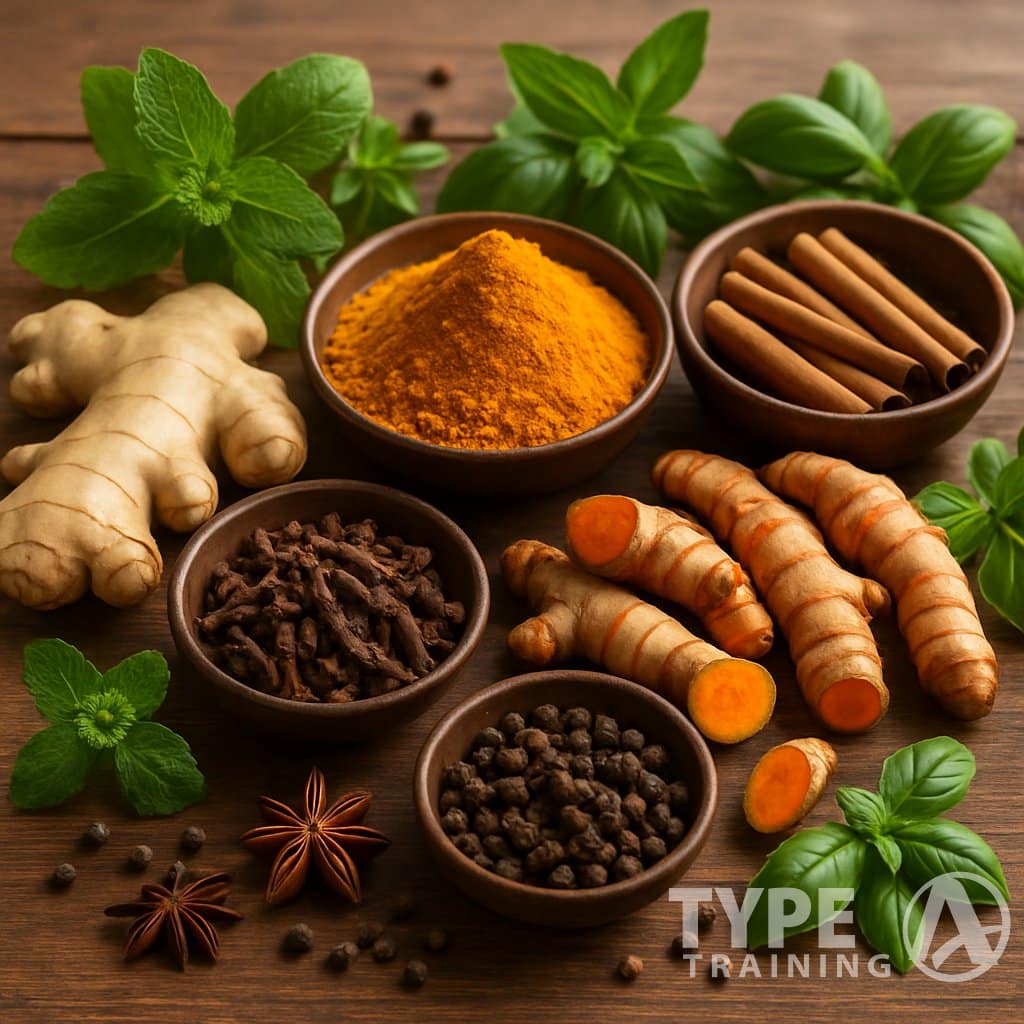
Spices do more than just jazz up your food. They contain compounds that fight inflammation and support your gut.
These natural ingredients work through specific biological pathways, dialing down inflammatory responses and promoting digestive wellness.
Mechanisms Behind Inflammation and Gut Health
Inflammation is your body’s way of dealing with injury or infection. But chronic inflammation can wreck your gut lining and mess with digestion.
Anti-inflammatory spices block certain pathways that fire up inflammation. For example, eugenol in cloves suppresses inflammatory signals linked to conditions like asthma.
Some spices strengthen your gut barrier, stopping harmful stuff from sneaking into your bloodstream. Others help beneficial gut bacteria thrive, which keeps your immune system in check.
Ginger and turmeric go after pro-inflammatory enzymes like cyclooxygenase (COX) and lipoxygenase (LOX). That’s similar to how some meds work, but with fewer side effects.
Key Phytochemicals in Spices
Curcumin: Turmeric’s bright yellow hero is one of the most powerful anti-inflammatory agents out there. It tackles multiple inflammation pathways at once.
Gingerols: Found in ginger, these help by blocking nitric oxide production and shielding against oxidative damage.
Capsaicin: The heat in chili peppers comes from this. It reduces inflammation and pain by tweaking certain neurotransmitters.
Cinnamaldehyde: This cinnamon compound helps regulate immune response and lowers inflammatory markers.
EGCG: You’ll find this catechin in green tea and some spices—it suppresses genes that cause inflammation and packs a serious anti-inflammatory punch.
Scientific Evidence Supporting Spice Benefits
Research keeps showing that eating anti-inflammatory spices regularly can lower inflammation markers in your body. Clinical studies track drops in C-reactive protein (CRP) and interleukin-6 (IL-6) after folks add these spices to their diets.
A 2019 study had people eat 6 grams of spices daily for four weeks, and they saw a big drop in inflammatory markers compared to controls. Turmeric, ginger, and garlic have the strongest evidence behind them.
Bioactive compounds in these spices support your body’s natural inflammatory response in a bunch of ways. Lab studies show they can block pro-inflammatory cytokines and enzymes.
Regular, consistent use works better than just dabbling now and then. The anti-inflammatory effects add up over time, so stick with it.
Top Spices for Digestive Wellness
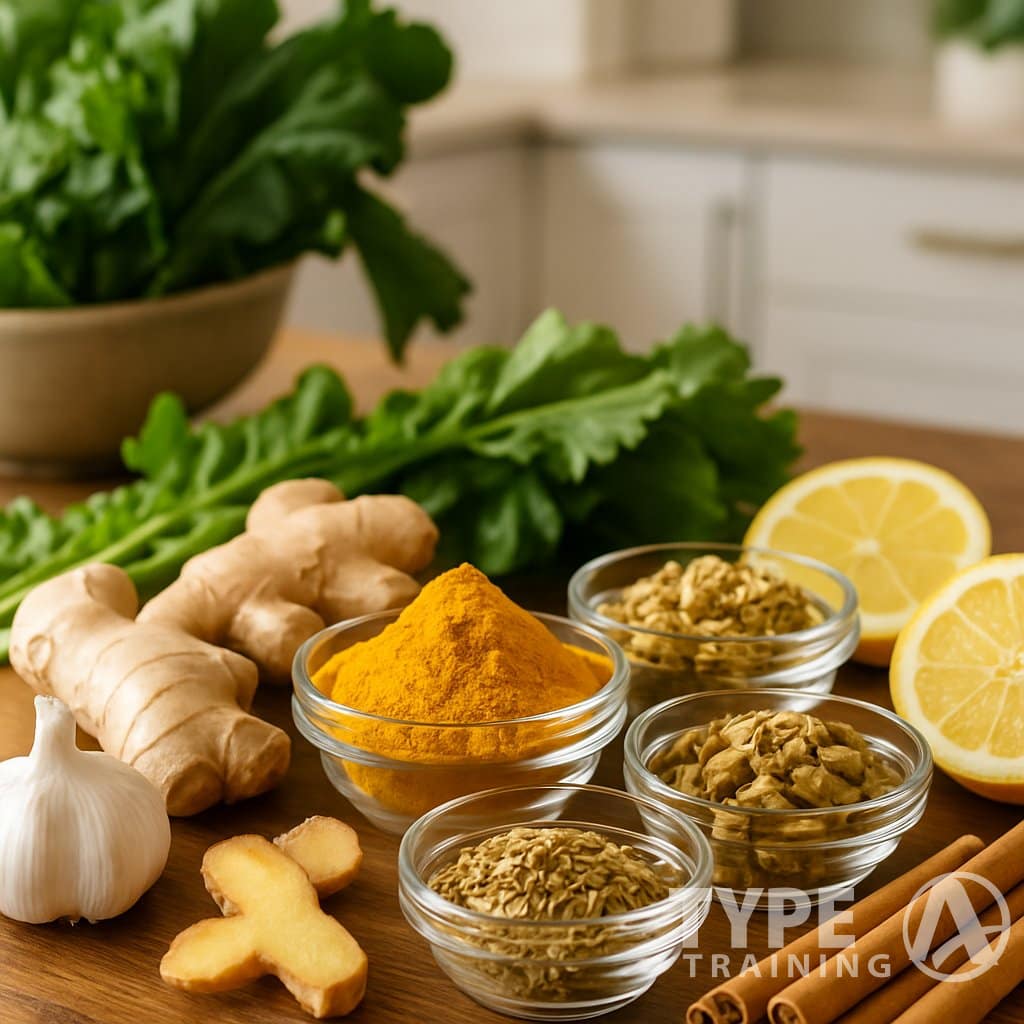
Just a few specific spices can totally change your gut health and calm inflammation. These natural remedies have stood the test of time in many cultures, and now science is catching up on their digestive benefits.
Turmeric: Curcumin and Its Gut-Healing Effects
Turmeric’s curcumin is a powerhouse for reducing inflammation in your gut. This golden spice can help ease symptoms of digestive disorders like IBS and inflammatory bowel disease.
Curcumin targets inflammation right at your gut lining. If you eat it often, it helps repair your intestinal barrier and supports a healthier microbiome.
If you want to get the most out of turmeric, mix it with black pepper. Piperine in black pepper boosts curcumin absorption—a lot, up to 2000%.
Try tossing ½-1 teaspoon of turmeric into:
- Smoothies
- Soups
- Rice dishes
- Golden milk (warm milk with turmeric and honey)
Daily recommendation: 1-3 teaspoons, split up in your meals.
Ginger: Soothing the Digestive Tract
Ginger is a go-to for quick relief from digestive woes. Its gingerols and shogaols cut inflammation and get your digestive juices flowing.
It’s great for nausea, bloating, and just general stomach gripes. Ginger speeds up how fast food moves through your system, so you’re less likely to feel stuffed or uncomfortable.
Fresh ginger is strongest, but ginger powder works too. If you’re feeling queasy, ginger tea is a lifesaver.
Ways to use ginger:
- Grate fresh ginger into stir-fries
- Brew ginger tea (slice a 1-inch piece and steep in hot water)
- Add to salad dressings
- Blend into smoothies for a spicy kick
Cumin: Promoting Optimal Digestion
Cumin seeds are tiny but mighty for digestion. They make your pancreas produce more enzymes, which means food gets broken down better—less bloating and gas.
Cumin comes from dried seeds of the Cuminum cyminum plant, and you’ll spot it in a lot of global dishes. Its essential oils may even help with IBS symptoms.
Cumin prompts your liver to make bile with more bile acids, which are key for digesting and absorbing fats. Fatty meals become easier to handle, and you’re less likely to feel off after eating them.
How to use cumin:
- Toast whole seeds before grinding for max flavor
- Add to bean dishes to cut down on gas
- Mix into veggie dishes to help with nutrient absorption
- Stir into yogurt with a pinch of salt for a quick digestive boost
Fennel Seeds: Balancing Gut Flora
Fennel seeds taste a bit like licorice and do wonders for your digestion. They’re loaded with anethole, which relaxes your digestive muscles and calms cramping.
They help keep your gut bacteria in balance, making it easier for the good guys to thrive. Plus, they’re carminative, so they help get rid of gas and ease bloating.
If your gut is sensitive or you have IBS, fennel can soothe the irritation in your intestines. Super handy.
Easy fennel ideas:
- Chew a teaspoon of seeds after meals to curb indigestion
- Make fennel tea by steeping crushed seeds in hot water
- Add to roasted veggies for flavor and gut perks
- Mix into homemade bread or crackers
Additional Spices That Support Gut Health
Aside from the usual suspects, there are other spices that can really help your gut health. These kitchen staples work by reducing inflammation and supporting a healthy gut bacteria balance.
Coriander: Calming Gut Inflammation
Coriander seeds and leaves (aka cilantro) are surprisingly good for digestive health. The seeds contain compounds that relax your digestive muscles and help with bloating and discomfort.
Research shows coriander has antimicrobial properties that help balance your gut bacteria and fight off unwanted bugs. If you deal with digestive issues like IBS, it’s worth a try.
How to use coriander:
- Add fresh cilantro to salads and salsas
- Use ground coriander in curries and soups
- Steep crushed seeds in hot water for a calming tea
The gentle carminative action in coriander seeds helps with gas and bloating, and supports your body’s natural digestion. For best results, use both seeds and leaves when you cook.
Cinnamon: Modulating Microbiota
Cinnamon does more than just add warmth to your foods. It actually supports a healthy gut microbiome in a pretty hands-on way.
This common spice is packed with polyphenols that act as prebiotics, feeding the good bacteria in your intestines. Studies show cinnamon can help regulate blood sugar, which in turn supports gut health by keeping inflammation down.
Its antimicrobial properties help keep your gut bacteria balanced, stopping the bad guys from taking over. Want to get more cinnamon into your day?
- Sprinkle it on your morning oatmeal or yogurt
- Add a stick to your tea or coffee
- Mix it into smoothies or baked goods
Choosing Ceylon cinnamon (the “true” kind) is a smart move—it’s got less coumarin than Cassia, which is better for your liver. Cinnamon’s knack for promoting a healthy gut microbiome makes it a keeper for long-term digestive wellness.
Cardamom: Relieving Gastrointestinal Discomfort
Cardamom’s aroma is unmistakable, and honestly, it’s a powerhouse for easing digestive woes. This spice stimulates digestive enzymes, helping your body break down food without so much fuss.
Cardamom’s carminative properties really shine if you’re dealing with gas, bloating, or cramps. You might find meals sit a little lighter when you use it regularly.
Looking to try cardamom for your gut?
- Add pods to rice dishes or curries
- Brew it with tea for a soothing digestive drink
- Include ground cardamom in baked goods
Recent research suggests cardamom may protect your gastric lining and ease inflammation in the digestive tract. Its soothing qualities can help alleviate symptoms of digestive disorders—and you won’t have to worry about the side effects that sometimes come with meds.
How to Add Anti-Inflammatory Spices to Your Diet
Adding anti-inflammatory spices to your meals doesn’t need to be a big production. With a few tweaks, you can bump up flavor and support your gut at the same time.
Incorporating Spices Into Everyday Meals
Start small. Toss half a teaspoon of turmeric into rice or dust cinnamon over your oatmeal.
Make your own spice blends for easy access. Mix equal parts turmeric, ginger, and black pepper in a jar—then just grab a pinch for soups and stews.
Morning boosters:
- Add 1/4 teaspoon cinnamon to coffee grounds before brewing
- Mix 1 teaspoon ginger powder into smoothies
- Sprinkle cloves on fruit or yogurt
Dinner enhancers:
- Add bay leaves to soups (just remember to fish them out before serving)
- Mix oregano into tomato sauces
- Use garlic and ginger as a base for stir-fries
Try infusing oils with anti-inflammatory spices. Warm up some olive oil with rosemary or oregano for a tasty base for dressings and marinades.
Curtailing Potential Digestive Irritation
Spices are great, but your gut might need a little time to catch up. Start with 1/8 to 1/4 teaspoon per dish and see how you feel.
Some spices—like cayenne or garlic—can be a bit much for sensitive stomachs. If you notice any discomfort, just cut back or try gentler options like turmeric or cinnamon.
Eating spices with food (not on an empty stomach) usually helps minimize irritation. This tip’s especially handy with stronger spices like ginger or cloves.
Spice sensitivity chart:
| Spice | Potential for Irritation | Better Alternative |
|---|---|---|
| Cayenne | High | Black pepper |
| Raw garlic | Medium | Roasted garlic |
| Cloves | Medium | Cinnamon |
If you have IBS or acid reflux, cook your spices instead of using them raw. Heating helps mellow their punch without losing the benefits.
Synergistic Effects of Combining Spices
Some spice combos are just better together. For example, black pepper boosts turmeric’s bioavailability by up to 2,000%—wild, right?
Ginger and cinnamon make a cozy pair that supports digestion while fighting inflammation. Toss them in tea or baked goods for a delicious kick.
Powerful anti-inflammatory combinations:
- Turmeric + black pepper + healthy fat (olive oil)
- Ginger + cinnamon + cloves
- Garlic + oregano + bay leaves
Try making herbal teas by steeping fresh ginger, cinnamon sticks, and cloves in hot water for 5-10 minutes. It’s soothing and good for your gut.
Experiment with cuisines that already blend these spices—Indian curries, Moroccan tagines, and Mediterranean herb mixes have this down to an art. Seriously, why reinvent the wheel?
Precautions and Tips for Using Spices Safely
Spices can do a lot for your health, but you’ve got to use them right. Store them properly, stick to sensible amounts, and double-check for medication interactions to keep things safe and effective.
Recommended Dosages and Possible Side Effects
Most culinary spices are safe in food-sized amounts—think ¼ to 1 teaspoon per serving. If you’re aiming for therapeutic effects, start low and ramp up slowly as your body adjusts.
Toasting spices on low heat brings out more flavor, so you don’t need as much.
Common side effects to watch for:
- Digestive discomfort (especially with large amounts)
- Heartburn (especially with hot spices like cayenne)
- Allergic reactions (skin rash, itching, breathing issues)
Keep turmeric under 1-3 grams a day—too much can upset your stomach. Cinnamon’s limit is about a teaspoon daily, since cassia cinnamon’s coumarin may affect your liver if you go overboard.
Store spices in a cool, dry spot around 70°F. Don’t stick them above your stove; heat wrecks the oils that make spices so good for you.
Interactions With Medications
Lots of anti-inflammatory spices can interact with prescriptions, especially blood thinners, diabetes meds, or blood pressure drugs.
Key medication interactions:
- Turmeric/Cumin: May boost blood-thinning effects of warfarin, aspirin
- Ginger: Can interact with
blood pressure and diabetes meds - Cinnamon: Might amplify diabetes meds, risking low blood sugar
Always buy spices from reputable sources to avoid contamination. Some poorly sourced spices can carry foodborne risks.
If you’re pregnant, nursing, have health conditions, or take prescriptions, talk to your healthcare provider before using spices therapeutically. This is especially true if you’re considering supplements or concentrated extracts.
Frequently Asked Questions
These FAQ tackle what people really want to know about using spices and herbs for gut health and fighting inflammation. You’ll find info on healing ingredients, foods to lean toward or skip, and some practical tips for better digestion.
What herbs are known to effectively heal the stomach lining?
Several herbs have shown real promise for healing the stomach. Ginger stands out for its ability to calm inflammation and protect your stomach lining.
Marshmallow root is loaded with mucilage, which coats irritated stomach lining and helps it recover. Slippery elm does something similar and has a long track record for ulcers and gastritis.
Licorice root (the DGL kind) supports mucus production, which shields your stomach walls. Chamomile tea can calm inflammation thanks to its apigenin content.
If you’re into aloe vera juice, make sure it’s prepared for drinking—it may soothe and help repair your stomach lining, too.
Which spices have been proven to significantly reduce inflammation in the body?
Turmeric’s curcumin is a heavy hitter—its anti-inflammatory effects rival some meds, minus the tough side effects. Always pair it with black pepper for better absorption.
Cinnamon can lower inflammatory markers and may help keep blood sugar in check.
Cloves are packed with anti-inflammatory power thanks to eugenol. Rosemary fights inflammation and oxidative damage with rosmarinic acid.
Ginger reduces inflammation with its gingerols, and cardamom has also shown promise in research.
Sage and cumin bring solid anti-inflammatory effects and fit easily into most meals.
Are there specific foods that should be avoided for maintaining gut health?
Processed foods with artificial additives, preservatives, and emulsifiers can really mess with your gut flora. They might even damage your intestinal walls. You’ll find these in all sorts of packaged snacks, ready meals, and, of course, fast food.
Eating too much refined sugar feeds harmful bacteria and yeast in your gut. That’s stuff like sodas, candy, and even a lot of breakfast cereals.
Alcohol tends to irritate your digestive tract. It can change up your gut microbiome in ways you probably don’t want. Red meat—especially the processed kind—might trigger gut inflammation for some folks.
Foods high in advanced glycation end products (AGEs) show up in things cooked at high temps, and they can ramp up inflammation. And if you’re sensitive, gluten and dairy might set off digestive issues too.
What are the top foods recommended for improving both gut and skin health?
Fermented foods like yogurt, kefir, sauerkraut, and kimchi bring in good probiotics. These can help your gut flora and sometimes even improve skin stuff like eczema or acne.
Omega-3 rich foods—think fatty fish, flaxseeds, and walnuts—help dial down inflammation in both your gut and your skin. Fatty fish makes an excellent replacement for red meat in an anti-inflammatory diet.
Colorful fruits and veggies give you antioxidants and fiber, both of which your gut bacteria love. They’re also great for protecting your skin cells. Bone broth brings collagen and amino acids, which can help repair your gut lining and boost skin elasticity.
Green tea’s polyphenols help reduce inflammation and support good gut bacteria. Seeds like chia, hemp, and pumpkin offer zinc and healthy fats that your gut and skin both need.
Can you list the best snacks to incorporate for enhanced gut wellness?
A handful of nuts—walnuts and almonds especially—packs fiber and healthy fats for your gut. Go for unsalted if you can.
Greek yogurt with berries is a smart combo: you get probiotics, antioxidants, and fiber all at once. Just check the label for added sugars and skip those if possible.
Sliced apples with almond butter bring prebiotic fiber and protein, and they’re usually pretty easy on digestion. Roasted chickpeas are another solid choice—they’ve got resistant starch that feeds your gut’s good bacteria.
Kefir smoothies pack a probiotic punch and can help mix up your gut microbiome. If you like crunch, vegetable sticks with hummus give you prebiotic fiber and anti-inflammatory perks from ingredients like garlic and olive oil.
Whole grain crackers with avocado deliver fiber and healthy fats, both of which your digestive system will thank you for.
Which common dietary supplements might be harmful to gut health?
Antibiotics in supplement form can mess with your gut flora by wiping out good bacteria along with the bad. Only take these if your healthcare provider actually prescribes them.
Some artificial sweeteners—yep, the stuff in a lot of “sugar-free” supplements and protein powders—might change up your gut bacteria and possibly make your body deal with glucose less effectively.
Iron supplements, if you don’t really need them, can feed the wrong bacteria and leave you feeling constipated. Always double-check for a deficiency before you start popping iron pills.
NSAIDs like ibuprofen, especially if you take them often, can mess up your gut lining and make it leakier than it should be. And let’s not forget, some supplements sneak in emulsifiers and fillers that just end up irritating your digestive tract.
If you go overboard with prebiotic fiber supplements, you’ll probably get gas and bloating—especially if you add too much too fast. It’s smarter to start small and see how your gut handles it before ramping up.
